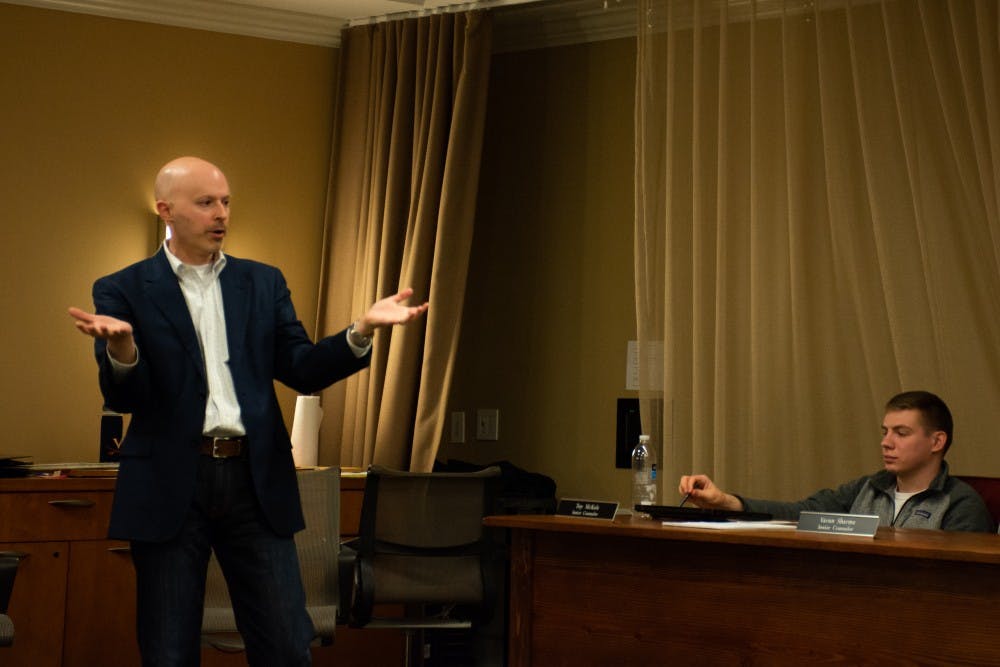Marsh Pattie, assistant vice president of student affairs, spoke to the University Judiciary Committee Sunday evening. Pattie was a former member of UJC and was given the responsibility of advising the group this year.
Pattie explained his position as advisor to the committee and encouraged members to consider their leadership role in fulfilling the University’s philosophy of student self-governance.
“You have to be able to make mistakes, and to learn from those mistakes and recover from those mistakes,” Pattie said to UJC. “And the heart of what this body does is to hold people accountable for their mistakes, but to do it in a way that is educational, that supports their learning and growth and does protect the community.”
The advisorship gives Pattie the ability to affirm, remand or send UJC cases to the JRB. The advisor also oversees UJC policy procedures, including changes to the committee’s constitution and bylaws, as the UJC constitution must be approved by University Counsel.
Jordan Arnold, fourth-year College student and the UJC’s vice president for sanctions, inquired as to whether Pattie’s review authority could undermine the significance of the UJC in the process of student-self governance. Pattie ensured students that he intends to uphold the authority of the committee.
“It’s not meant to be something that is proactive and where our arms are coming in and controlling the management,” Pattie responded. “From me — from someone who has sat in those various chairs — that’s the way it has to be.”
Pattie’s involvement with UJC has been extensive, having served as a representative when he enrolled as a master’s student in the Curry School of Education. Pattie also worked “on the other side of the bench” as a complainant who submitted cases to the committee. Later, as a member of the Judicial Review Board, Pattie had jurisdiction over cases brought to the board from UJC trials. With respect to UJC, the JRB reviews cases that are either appealed from a UJC trial’s original jurisdiction, or UJC cases that are submitted for review by the vice president and chief student affairs officer.
Pattie later obtained his Ph.D. from the Curry School and has since has worked as a dean for the Darden School of Business and as associate dean of students. Pattie’s current role as vice president of student affairs led to the position of UJC advisor.
Pattie said in an interview with The Cavalier Daily that he sees his position as an opportunity to engage with students and maintain the institution of student self-governance.
“My role is not to tell them what to do or how they should do it — it’s to help them think that through themselves…” Pattie said. “I’m a product of student self-governance, I had the great fortune to be part of the UJC and other student organizations, and I want to be able to give that same opportunity to other people as well.”
Kevin Warshaw, fourth-year Engineering student and UJC chair, said his role as an agent of student self-governance has been a particularly rewarding aspect of his experience on the committee.
“It’s allowed me to develop my soft skills — to be able to hear from the incoming student, hear their experiences and craft an appropriate sanction that allows them to be welcomed back into our community,” Warshaw said. “I think that’s been by far the most important part of my involvement with UJC.”
In accordance with the committee’s responsibilities, Pattie discussed Va. House Bill 1831, which would give students at public universities access to an attorney for trials of student conduct. In UJC trials, legal counsel is provided by UJC’s student counselors.
Pattie also spoke about new Title IX regulations that have been proposed by the U.S. Department of Education's Office for Civil Rights. The proposed conditions would connect the preponderance of evidence standard that is applied to Title IX civil cases to other cases of student conduct, which values the weight of evidence presented, rather than the amount of evidence presented. In cases not related to Title IX, UJC operates on the evidential standard of beyond a reasonable doubt, which is the justice system’s requirement for evidence in criminal cases, where the tried student is innocent until proven guilty. The regulation would thus decrease the amount of evidence necessary for student conduct trials from that of a criminal case to that of a civil case.
Pattie noted that the committee should be aware of these procedures happening at state and federal levels, which may potentially influence the student experience at the University. Pattie and Warshaw added that both the University and UJC were positioned to lobby against Va. House Bill 1831, but the bill did not make it out of committee.
“We were prepared to advocate for our beliefs when it came to those positions being proposed in the bill,” Warshaw said. “Fortunately it died in committee, so that wasn’t a step we had to take, but we were prepared to defend the current iteration of self-governance that we enjoy at U.Va.”







